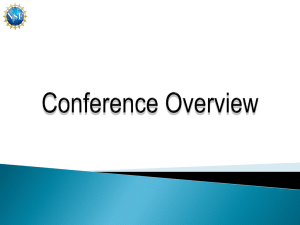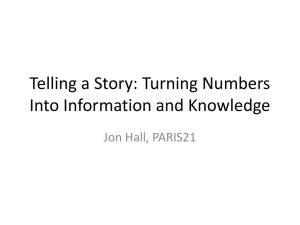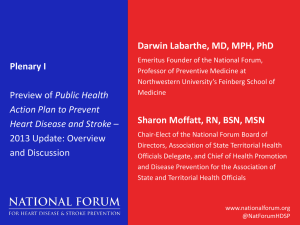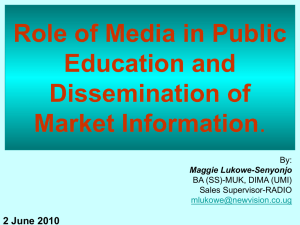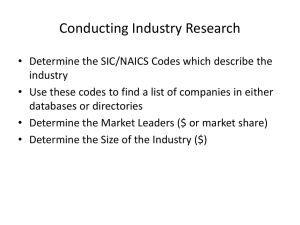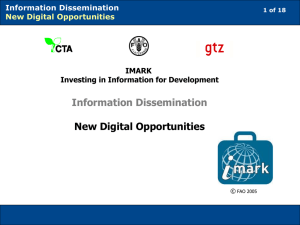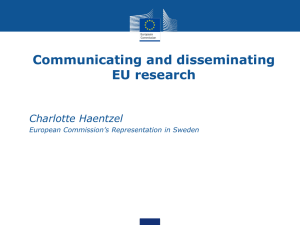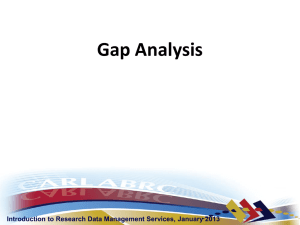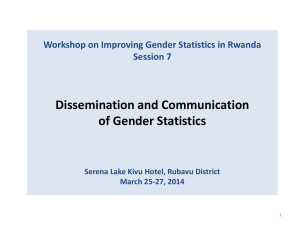Standard Title Slide Title Line Two
advertisement
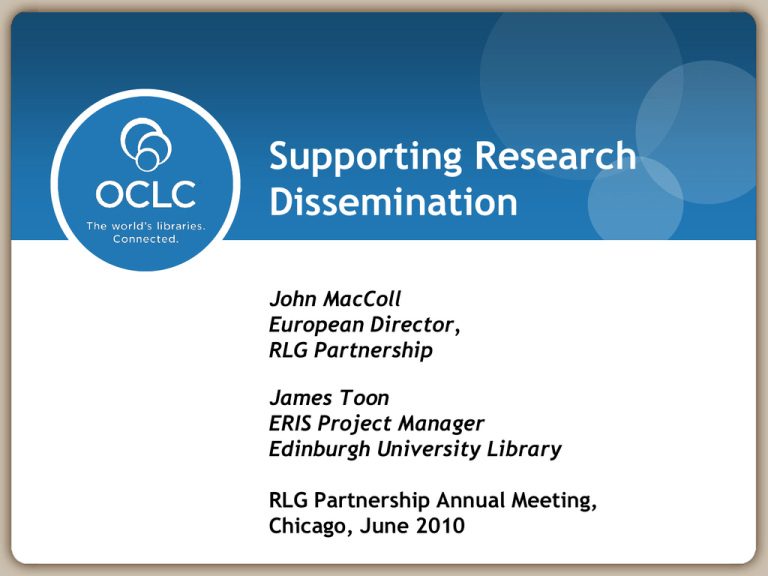
Supporting Research Dissemination John MacColl European Director, RLG Partnership James Toon ERIS Project Manager Edinburgh University Library RLG Partnership Annual Meeting, Chicago, June 2010 Context Supporting Research Dissemination 2 Minnesota: anthropological approach Supporting Research Dissemination 3 Actionable intelligence … Assisted thinking Analysis and synthesis of the available evidence base Improved understanding for library management oclc.org/research/publications/library/2009/2009-02.pdf Supporting Research Dissemination 4 Breaking behaviours down by discipline Interdisciplinary probing translating accessing assessing Humanities chaining browsing collecting re-reading disseminating networking assembling consulting note-taking Sciences direct searching scanning co-authoring coordinating monitoring data-sharing Adapted from C. Palmer, L. Teffau, C. Pirmann (2009) Supporting Research Dissemination 5 RIM: overlapping environments Supporting Research Dissemination 6 Meeting researchers’ needs Supporting Research Dissemination 7 RIN Supporting Research Dissemination 8 Ithaka Supporting Research Dissemination 9 UCB Supporting Research Dissemination 10 Our joint project with UK Research Information Network: Support for research workflows Supporting Research Dissemination 11 New elements to our study • Focus on dissemination excluding traditional journal and monograph publishing • Focus on subject librarians/faculty liaisons • Focus on repository support for scholarship Supporting Research Dissemination 12 Enhancing Repository Infrastructure in Scotland Supporting Research Dissemination 13 Scotland and Open Access Supporting Research Dissemination 14 Some history: Scottish Collaboration in Open Access • History of collaborative activity (i.e. SCURL, SHEDL, SDLC, IRIScotland, ERIS) • Open Access as a reaction to the ‘scholarly communications crisis • Open Access meeting 11th October 2004, Royal Society of Edinburgh • Scottish Declaration on Open Access launched at that meeting (OATS) • First joint OA project IRIScotland funded by JISC June 2005 and ran until 2008 Supporting Research Dissemination 15 Scope, aims and objectives • Development, assessment and engagement of user communities • Raise issues surrounding the longevity and broader value of research output • ‘Attending to the demand side’, technologically • Strategic recommendations, business planning and sustainability Supporting Research Dissemination 16 Scottish toes in the water … Supporting Research Dissemination 17 A few findings from our work http://www.flickr.com/photos/adambot/2733161467/ Supporting Research Dissemination 20 Levels of engagement • 69.7% (216) of respondents were aware of the existence of a repository • 44.8% (139) have deposited something in their repository, with 80% finding it either very easy, or easy to do. 80% 70% 60% 50% 40% Arts & Humanities 30% Biosciences 20% Science & Engineering 10% 0% Aware of your IR? Supporting Research Dissemination Ever used it? Ever used SRs? Social Sciences 21 Levels of engagement However on average, only 15% submit to their IR as a matter of course as well as to publishers Put the approved copy of the submission onto a networked drive at my institution so it is backed up 12% Deposit in a subject based repository 3% Keep on my local PC/Laptop 40% Put an approved copy on my personal or departmental website 12% Send them to a departmental administrator to manage/store 7% 15% Supporting Research Dissemination deposit in my institution's repository 15% Copy to a CD/DVD and file offsite 11% 22 Levels of engagement • Repositories are being used for research, but very rarely are they used directly. • Normally via referral (43% via search engine, and 16% referral from colleague Supporting Research Dissemination Never used an institutional repository 22% Direct search using institutional repository 19% (11% own, 8% other) Referral to institutional repository (via search engine or personal referral) 59% 23 From focus group work (some key points) – open access • Researchers generally see repositories as being there to support their institutions support for OA • Personally they are generally supportive of OA, but there are pro’s and con’s and no single convincing argument (and don’t think their should be) • Researchers have been doing OA – if they wanted to – for years now, by fair means or foul! • Variation in support across career paths (early career to senior academic) • The drive to OA can be damaging in some cases Supporting Research Dissemination 24 From focus group work (some key points) • The pressure to publish in recognised journals is significant, and is an administrative and career need (in the UK at least) • Must have ability to exercise personal control over everything that is in the repository (to provide or revoke access at will) • Repositories don’t offer anything that the researcher finds sufficiently of value to motivate deposit. • Library providers are disconnected from the researchers real needs (as far as researchers are concerned) Supporting Research Dissemination 25 Long term availability and reuse of research • Those responsible for service and support are unequipped; • Low awareness of digital curation and preservation issues, and little to no practical experience • Policies that do exist are part of corporate initiatives and are often box ticking exercises • Domain specific guidance for preservation and curation policy tends to sit outside of the institution, indicating issues of leadership and direction Supporting Research Dissemination 26 Long term availability and reuse of research • Those responsible for research are unequipped; • Open access is easy in relation; [insert your term here] curation is hard. • Potentially huge overhead for the researcher • Services for preservation and curation support are generally lacking • ‘We can't stand on the shoulders of giants if we only have access to their knees ’ 1 • Growing support for principle of open scholarship, but requires change in philosophy, not practice. 1. Quote from Vision Learning Blog, may 24th 2010 http://visionlearningcommunity.blogspot.com/2010/05/journal-nature-continues-open-access.html Supporting Research Dissemination 27 Indication of the scale of the issue Put the approved copy of the submission onto a networked drive at my institution so it is backed up 12% Deposit in a subject based repository 3% Keep on my local PC/Laptop 40% Put an approved copy on my personal or departmental website 12% Send them to a departmental administrator to manage/store 7% deposit in my institution's repository 15% Supporting Research Dissemination Copy to a CD/DVD and file offsite 11% 28 Indication of the scale of the issue Put the approved copy of the submission onto a networked drive at my institution so it is backed up 12% Deposit in a subject based repository 3% Keep on my local PC/Laptop 40% Put an approved copy on my personal or departmental website 12% Send them to a departmental administrator to manage/store 7% deposit in my institution's repository 15% Supporting Research Dissemination 63% Copy to a CD/DVD and file offsite 11% 29 Research pooling • Not just for assessment, but for effective strategic management of research • Genuine desire for full text and bibliographic data for knowledge management (KT really important) • Have strong backing from their members. Discipline trumps institution. • Data must be broader than just IR – need to include HR, Finance, Knowledge data, Grant data, Funder data……. • They know they want data, but they don’t know what they want or how to define it. Supporting Research Dissemination 30 A few observations (not conclusions) • Systems and services not based on user needs • Repository use often by ‘accident’ • There is no single approach – every institution/discipline/researcher is different • Its all about me, me, me. • We can often talk in a foreign language • We can often not talk at all • Failure to add value has meant that we had to resort to mandates/requirements – sticks not carrots. Supporting Research Dissemination 31 ‘What is the future of the repository?’ • As it is – are we heading the way of the Dodo? • Must gain trust of the users • Two clear paths – support for knowledge and research, and support for research management • Institutional repositories are only part of the ecosystem of systems servicing the research life cycle http://www.flickr.com/photos/44124372821@N01/167871469 Supporting Research Dissemination 32 Work with users to gain trust and define direction • Stakeholder communities are identifiable and similar across Higher Education • Many varied needs. • Roles and mission are however not universally well defined in context. • Lack of internal support means they are often looking outside their institutions for comfort. • Stakeholder groups want to collaborate and communicate • Need greater facilitation. Opportunities for national networks Supporting Research Dissemination 33 Develop roles and up-skill support services • All through the ERIS exercise, the need for effective research support has been key • Need to develop specialist roles to support the research life cycle • Take a role in helping researchers with the dissemination of knowledge • Work more closely together with research offices as ‘information specialists’ • Economies of scale in services need to be considered for cost/benefit (unpopular) Supporting Research Dissemination 34 Support the dissemination of knowledge • Open access is still a goal, but not *THE* goal of repositories. Discuss. • Open scholarship/knowledge revolves around effective curation of ‘data’. Discuss. • “The coolest thing to do with your data will be thought of by someone else1” • Being linked and being open is important (open standards esp.) • How to engage in an open, social world. Participate, collaborate and innovate – not reinvent the wheel. 1. Attributed to Rufus Pollack, via http://blogs.talis.com/nodalities/2007/05/xtech_day_3_rufus_pollock_and_.php Supporting Research Dissemination 35 Research Information Management Systems Image reproduced with kind permission of the Universities of Aberdeen and St Andrews Supporting Research Dissemination 36 Make change to an objective, outcome based approach. • Programme of activity to develop enhanced capability over time. • Investment in enabling activities • Services for researchers • Services for strategy and management • Services for ‘service managers’ Supporting Research Dissemination 37 The study Supporting Research Dissemination 38 Researcher behaviours • This Working Group will look at the use of repositories – institutional and subject – and other venues where attention is focused by various communities • It will examine social networking mechanisms for dissemination, considering the spectrum of community services grouped around research activity (including informal community spaces, blogs, blog aggregation services, microblogging, etc ) • Faculty participants will also be asked about tools and services not currently available that they would value, at institutional and at domain levels • Focus will be on the use of repositories, not the deposit process Supporting Research Dissemination 39 Library responses • How are changing researcher practices being monitored by libraries? • What does the use of these tools and services imply for libraries (eg in respect of harvesting, curation, bibliometric services and preservation)? • What new services should libraries provide (eg bibliometric data reports generated from repositories)? • Is there missing infrastructure that might valuably connect discrete data sources to serve research bibliographic and data curation needs? • How do libraries support scholarship rather than administration? Supporting Research Dissemination 40 U Minnesota: Karen Williams on changing faculty liaison roles (ARL study): from new Position Description Framework Supporting Research Dissemination 41 Nil desperandum … Hugh Glaser (Computer Scientist, U Southampton); email to JISCREPOSITORIES, 2 June 2010 ‘the pages the School was offering for me by embedding my publication data in the official profile pages was far superior to anything I could make myself’ Supporting Research Dissemination 42 U Minnesota: Karen Williams on changing faculty liaison roles (ARL study) Supporting Research Dissemination 43 Process Supporting Research Dissemination 44 RLG-RIM SRD group – Plan/Process (1) • Identify and define scope of stakeholders and how are they going to contribute to the project • Establish contact with contributing group • Write and agree project definition work • Arrange telcon to sign off approach with stakeholders at end June • Project Website and social tools to be used for user communication and collaboration • Set up and make available communication routes • Set up simple communications plan by end June Supporting Research Dissemination 45 RLG-RIM SRD group – Plan/Process (2) • Liaison librarian engagement plan • Agree data collection method, questions and targets for work by end June • Prepare materials for project participants • Prepare datasheets, questions, check-sheets etc for data collection by mid July • Compiled, ordered data from sources • Data returned, sorted and ordered by end August • Mid August partner telcon to discuss progress and push if necessary • Data analysis • Review of collated data and order for reporting by end Sept Supporting Research Dissemination 46 RLG-RIM SRD group – Plan/Process (3) • A Final report on the RLG/RIM SRD activity for publication • First draft out for review by mid Oct. • Partner telcon at end Oct to sign off report for publication • Publication due mid November. • Planning for alternative dissemination routes • Set activities to promote final report (presentations, blog posts) on ongoing basis • Closure report, identifying follow on actions including handover and wind-down activities • Project wind down and hand over to RLG by end November Supporting Research Dissemination 47 Discussion! maccollj@oclc.org james.toon@ed.ac.uk Next up 4:00 Lightning Rounds Buckingham Supporting Research Dissemination 49
